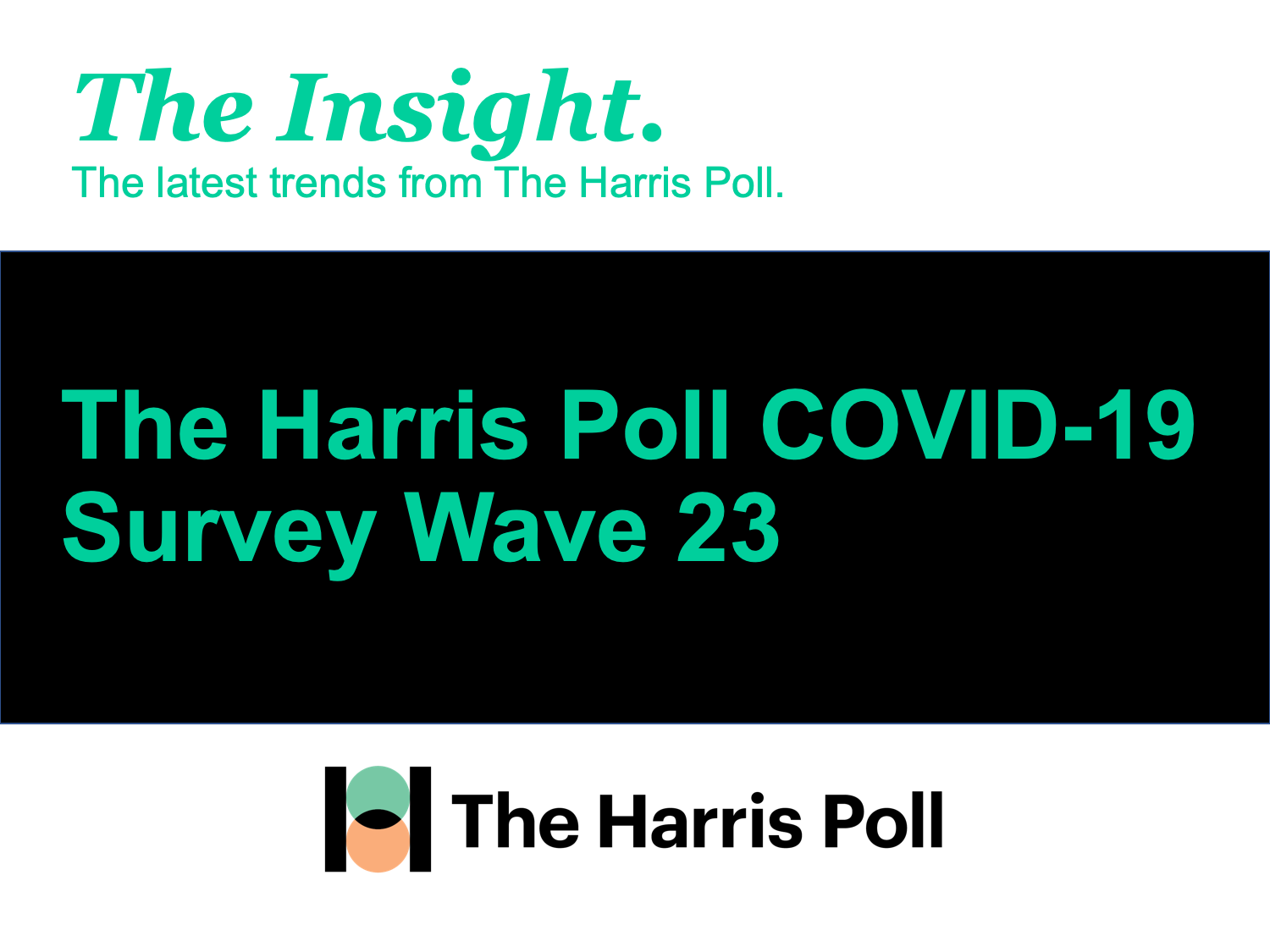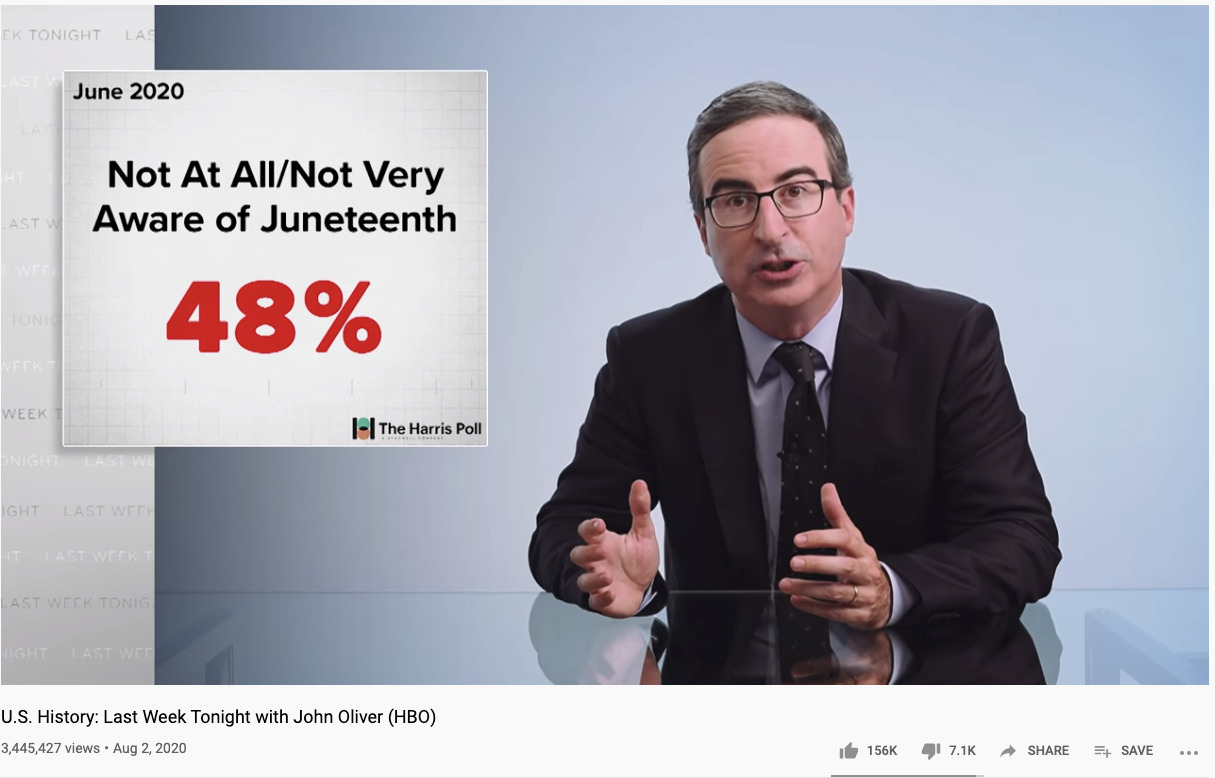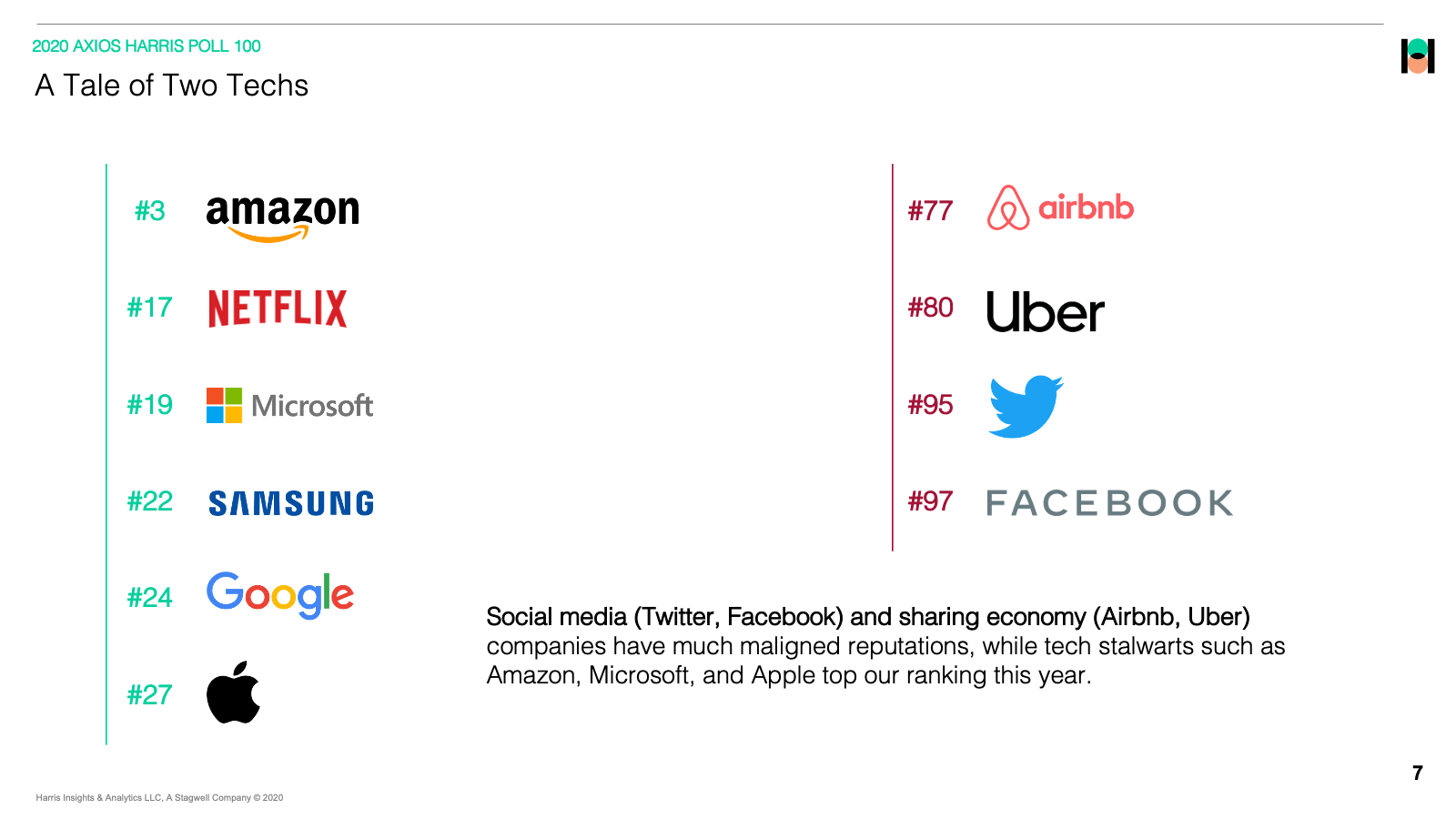Brief • 4 min Read

In Week 23 of The Harris Poll COVID-19 Tracker fielded July 31st- August 2nd, 2020, we polled Americans on who’s to blame for the rising cases now migrating from cities to rural parts of the U.S. Our data finds growing attention is turning to what it means to be a citizen in stopping the super-spreaders, which are moving from people to events. We also see a generational gap emerging (as well as a lot of entitlement).
Also, baseball is back but Americans don’t think for very long. Autumn pessimism is creeping into our data on sports, schools, and working at the office. Can we save the season? The Yankees are 8-1!
Americans are also watching the rising crime across the nation. And they want more policing. But it’s a complicated story that’s fluid and speaks to the intersecting fears of COVID, protecting property and making progress on racial injustice. Fix them all, but don’t defund, say most citizens.
And while the FAANG was on the Hill getting de-fanged by Congress, our Axios-Harris Poll Corporate Reputation Study found some interesting fissures between technology companies. Turns out it’s not ‘big tech’ but ‘good and bad’ tech. There are clear dividing lines emerging.
Lastly as we recognize the often under-reported role Black Women are playing in leading today’s racial justice movement. Americans are not as aware of this, as they are not aware of Juneteenth in a feature segment of Harris Poll data on John Oliver.

The Harris Poll featured at the 2:15 minute mark.
As a public service, our team has curated key insights to help leaders navigate COVID-19. Full survey results, tables, and weekly summaries can be accessed for free at The Harris Poll COVID-19 Portal. We will continue to actively field on a regular cadence to track the shifts in sentiment and behaviors as the news and guidelines evolve.
Risky Business
Look, we get it. People are sick of life interrupted. Almost three-quarters (74%) of Americans miss gathering with friends and family, and (70%) miss dining in bars and restaurants. And this is true especially of young people. On Monday, NJ Governor Phil Murphy-D rolled back indoor events from (100) to (25) people which left us asking who is indoors with one-hundred people? People are very concerned, so why aren’t our lawmakers?
- Americans are growing more wary of gatherings. Over the past weekend, (82%) of Americans are fearful of leaving the house (up 5 pts from July 19), while (69%) are not willing to attend a large public event given the current outbreak of COVID-19.
- Anything big and indoors is verboten: (58%) say they won’t go to the movies for at least another six months, the same as sporting events (49%), gyms (59%), hotels (55%), public transportation (54%), and airplanes (46%). And (13%) say there are no actions that will make them comfortable to do certain activities, so it’s a lot of Netflix.
- Older Americans are taking the pandemic more seriously: Adults 65+ (83%) think the amount of fear is sensible given how serious the pandemic has become vs (73%) of the nation or (68%) of Gen Z/Millennials.
- And seniors are more fearful of the virus spreading when we return to normal public activity: (80%) of 65+ are very/somewhat concerned about possible COVID-19 exposure when returning to normal activity vs (68%) Gen Z/Millennials.
- But younger people are nearly twice as likely to say people are overreacting: (32%) of 18-34 year olds say the amount of fear around COVID-19 is irrational and people are overreacting vs only (17%) of adults 65+.
- Alas, a nation gets COVID-woke: Less than four weeks ago, under one-third (31%) of Americans said the resurgence of cases was driven by people in their state who lack concern for the pandemic and (29%) said there was no incentive for people to follow state recommended safety protocols as they were not enforced requirements.
- But now, (84%) of Americans support social distancing and wearing face masks. And mask wearing rose (14 pts) from March 28 to June 15 (54% to 68%) which was attributed to those who were indifferent to masks: (33% said ‘neither positive or negative’ on March 28, which has decreased to 19% on June 15).
- But the generational blame game is starting in earnest: Older people blaming younger people: On May 17th we found that more than three quarters of adults 50+ (77%) said younger Americans are being ignorant by thinking they are less likely to spread COVID-19 than others and (72%) say they are acting reckless and putting the rest of the nation’s health at risk. At the same time, more than half of younger Americans ages 18-49 (56%) say the over-fifties crowd are stubbornly sticking to their routines even though they are more at risk.
Takeaway: This slow pulling off of the nation’s band-aid is having devastating health and economic consequences. The lack of a Federal plan for battling COVID is obvious, but also is a growing clamor for the nation’s young people to live up to their purported ‘we’ values of climate change, universal income, and gender/racial equality. Why isn’t COVID equality one of these generational values, Boomers and seniors ask?
Play Ball?
Just days into Major League Baseball’s 2020 season, the Florida Marlins reported at least 20 reported positive cases of COVID-19 between players and coaches, including 18 total players testing positive that has caused multiple games to be postponed. And the St. Louis Cardinals front office fended off reports that their 13 players were not infected because of a casino visit. Americans say the national pastime is looking more like one hot mess. And they are waiting for the other cleat to fall:
- Despite strong viewership ratings over opening week, a majority of Americans (58%) say the MLB should not continue playing games due to COVID-19. There’s even a partisan divide: (56%) of Republicans say they should continue to play vs only one-third (33%) of Democrats.
- Pessimism Abounds: Regardless of their personal opinion, (58%) of Americans do not believe MLB will be able to finish their season. While Commissioner Rob Manfred says he’s “not a quitter”, he warned union leader Tony Clark during a Friday call that if the league and players don’t do a better job of following COVID-19 protocols and managing the virus, Manfred could shut down the shortened season, ESPN reported.
- Americans think circumstances will force MLB to stop anyway. First, there is high awareness of positive COVID tests: 78% of Americans say they’ve heard about MLB players testing positive for COVID-19.
- And despite expanded DH across both leagues this year and pumped-in crowd noise, (48%) of Americans say watching baseball is much more/somewhat more boring than before Cv19 (maybe because those fake baseball fans are creeping people out), with Boomers (64%) finding it more boring than Millennials (42%). That doesn’t factor in the number of Americans who thought baseball was a snooze before COVID-19.
- FiveThirtyEight looks at what it would mean if records are set during an abbreviated season.
Takeaway: The outlook for MLB does not portend well for other non-bubble (e.g. NBA) sports and shows how hard it is to control the virus even under a semi-controlled, protected environment.
Crime And Racial Justice
One of the more interesting stats in last week’s Harvard CAPS/Harris Poll was how the nation interprets social justice through the lens of personal safety and perceived threat. In it, an overwhelming majority of Americans support The Black Lives Matter protests; however, (72%) don’t believe the police should be defunded. And (77%) are concerned about the level of crime in America’s cities, of which (42%) blame the protests/protesters.
- As of this past weekend, (76%) of Americans say crime is on the rise in America. This perception exists across racial groups, with (77%) of White Americans and (72%) of Black Americans, and (81%) of Hispanic Americans.
- A majority (55%) think crime is rising in their city specifically. Urbanites (66%) are most likely to say crime is on the rise in their neighborhood while fewer suburbanites (50%) and rural Americans (49%) say crime is rising where they live.
- Instead of Defund, reinforce: Two-thirds say the same or more police are needed nationwide. Half (50%) of all Americans say the country needs more police officers. while (34%) say we should keep the number about the same. Just (16%) say fewer officers are needed.
- Among racial groups, (53%) of White Americans say more officers are needed compared to (37%) of Black Americans say we need more police. Around a fifth (21%) of Black Americans say we need less police while (43%) of this same group say the number of police officers should stay the same as we have now.
- Urbanites want more police in their communities. Perhaps in response to where the most pronounced protests have been (46%) of those in urban communities want more police in their city, compared to (37%) of suburbanites and (42%) of Americans in rural communities. These numbers all split toward Republicans wanting more police, not less.
Takeaway: The Harvard CAPS/Harris Poll also found that an overwhelming majority equate protests to riots, so the concept of defunding the police is unnerving. (85%) say the looters and rioters should be prosecuted, yet (51%) say that inner-city prosecutors are not pursuing them to justice. BLM has three-quarters of Americans supporting it, but the narrative that protests equals rioting is dog whistle to some Americans (e.g. Portland Federal Forces) that could derail the promise of racial justice.
Big Tech Divides In Two
The Harris Poll looked at last week’s tech hearing with the CEOs of Amazon, Apple, Facebook, and Google and wondered whether the hearing had any impact on the public’s view of the tech industry. In our Axios Harris Poll, corporate reputation soared during the pandemic, even for tech, which saw its reputation as an industry rise. Does the public feel differently after seeing the CEO’s up close?
- While certain members of congress have become more tech-literate question askers, Americans were left unmoved if much had changed:
- The majority of Americans (52%) said after last week’s hearing their view of the tech industry is neither more positive or negative.
- The House Antitrust subcommittee did land some punches however, particularly against first-time visitor Jeff Bezos and his treatment of third party sellers on its platform. There were (28%) who say after last week’s hearing they have a more negative view of the big tech companies and only (20%) say after last week’s hearing they have a more positive view of the big tech companies.
- But we’re finding it’s no longer big tech, but good vs bad tech. Americans have already begun to parse tech companies on the basis of usefulness, allyship, and intentions. Tech is dividing sharply in our Axios Harris Poll study.

- Tech hardware, digital-led delivery, communications and entertainment diverge sharply from social networks and a few platforms like Airbnb and Uber who have been hit hard by COVID. Our survey also found that media––especially social media––is untrusted by over two-thirds of Americans and is in the bottom two of respected industries in addressing the pandemic eclipsing only airlines. Facebook and Twitter rank at the very bottom for Trust (#97 and #96, respectively), while Airbnb and Uber don’t do much better (#80 and #81).
- A further dissection of the rankings show where tech is dividing along moral and ethical lines: Netflix (#16 for Ethics), Apple (#18), Samsung (#21), and Microsoft (#23). And despite their otherwise sterling reputations, Amazon (#3 overall but #24 Ethics) and Google (#24 overall but #41 Ethics) have an ethics deficit.
- Companies That Enabled Digital Home Acceleration: #13 Hulu, #17 Netflix, #31 Peloton, #28 Zoom, #42 DoorDash, #44 Instacart, #53 GrubHub all delivered value to American households while sheltering in place.
- The Economist cover story this week explores how Google sees itself as it approaches middle age and tries to avoid becoming a “conventional company.
Takeaway: Monopolistic market power, suppressing competition, destroying anonymity on the internet, acting as a platform and advantaged competitor are but some of the anti-trust attacks levied on the FAANG four. (Netflix was spared). But as WIRED points out, the real crime here is consumer indifference: “What we don’t want is for a company to get so big, to crush or absorb the competition so thoroughly, that it can stop caring as much about what the customer wants without jeopardizing its profits”. According to our data, the social media networks are the first ones on the consumer’s firing lines.
Here’s Why Black Women Deserve More Credit
Americans paid their respects to a great American, John Lewis last week for his legacy of social justice. And in revisiting the history of the social justice movement, we are slowly learning that the telling is wildly incomplete as it often overlooks the achievements of black women who paved the way; a systemic issue of knowledge and learning that Americans want to change.
- From civil rights, suffrage, Stonewall to #MeToo, black women have stood on the front lines of fighting for justice throughout history but haven’t gotten their dues, as recently discussed on The Daily Show with Trevor Noah. And the majority of Americans agree: (60%) do not think black women have received the credit they deserve for their role in the racial equality movement and more than 2 in 5 Americans (43%) say they never/rarely hear about the achievements of black women in the movement.
- The majority of Americans have never heard of black women who founded Black Lives Matter: 73% have never heard of Patrisse Cullors and Opal Tometi and 65% have never heard of Alicia Garza. Worse, less than a fifth (18%) are aware that the Black Lives Matter Movement was founded by black women…
- We see the same lack of awareness within the #metoo movement, (66%) have never heard of Tarana Burke, as well as Stonewall; (67%) have never heard of Marsha P. Johnson; (67%) Sylvia Rivera.
- The exclusion of Black women puts them at risk for greater harm: A recent study from the American Psychological Association found that Black women, who live at the intersection of racism and sexism, may be harmed when their unique experiences as Black women are not recognized. Our survey found that (53%) of Americans incorrectly think that black women’s experience of police brutality receives the same amount of media attention as black men’s experience. Yet activists created the #SayHerName campaign for this very reason: black women victims of police brutality often receive far less coverage than their male counterparts.
- Stewart Coles, lead researcher of the study says “This ‘intersectional invisibility‘ means that movements that are supposed to help Black women may be contributing to their marginalization.”
Takeaway: (76%) of black people feel this moment in the racial equality movement “feels different” than it has in the past and over half (54%) attribute that to the fact that people outside the black community are finally trying to listen and understand the plight of black people. But in order to achieve racial equality, history must be told equally too.
Subscribe for more Insights
Subscribe to our newsletter for the latest trends in business, politics, culture, and more.
Download the Data
This survey was conducted online within the U.S. by The Harris Poll from July 31 to August 2 among a nationally representative sample of 1,992 U.S. adults.
Download
Subscribe for more Insights
Subscribe to our newsletter for the latest trends in business, politics, culture, and more.
Download the Data
This survey was conducted online within the U.S. by The Harris Poll from July 31 to August 2 among a nationally representative sample of 1,992 U.S. adults.
DownloadRelated Content








